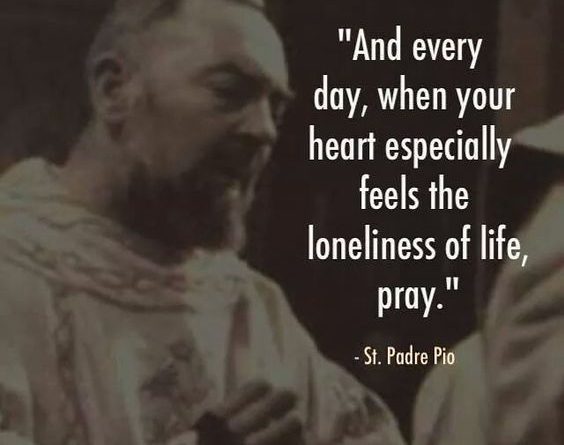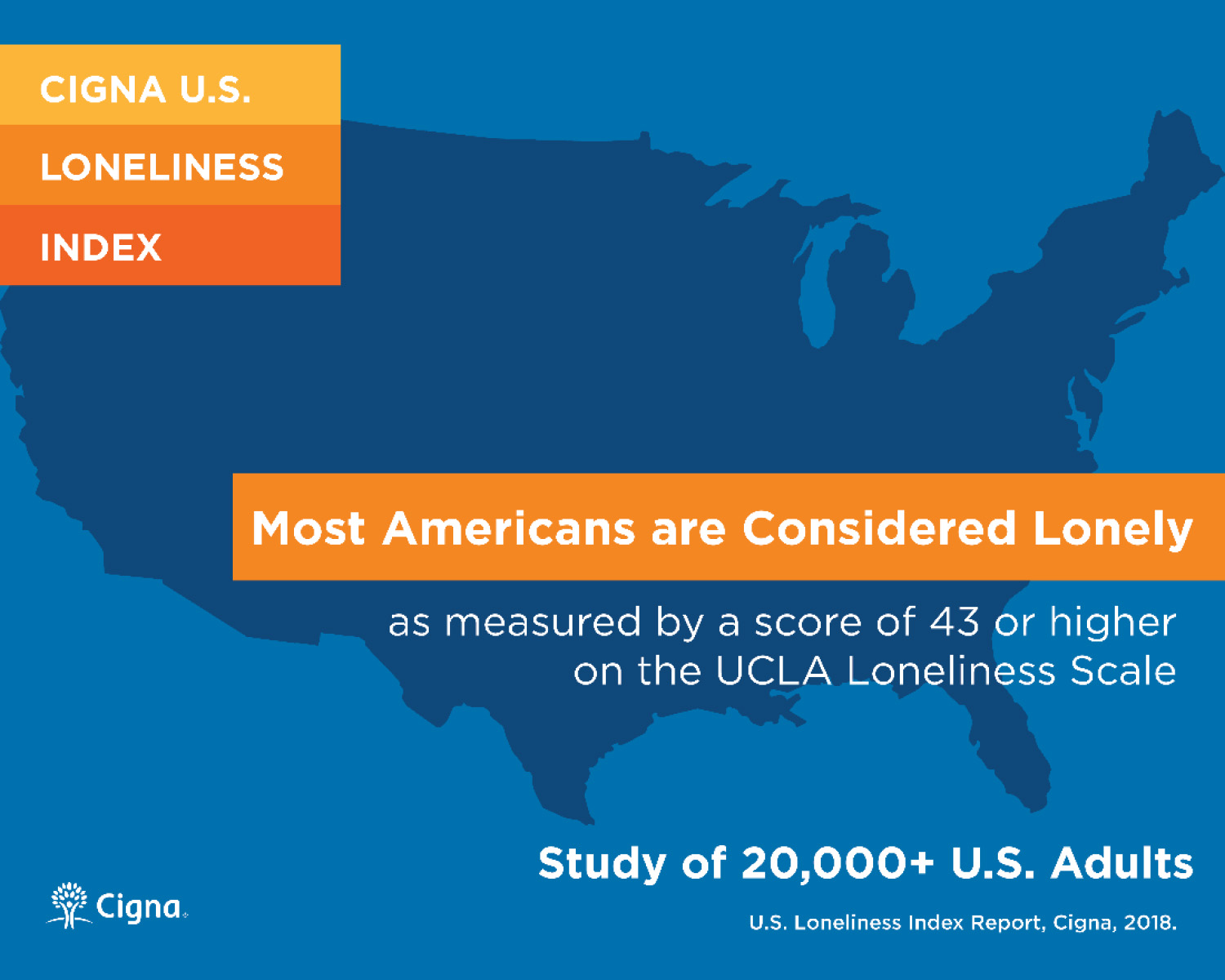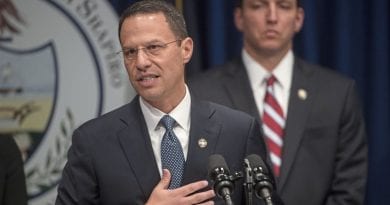Report: USA LONELINESS EPIDEMIC. “Most Americans are considered lonely”… With a prayer to fix the heart that has no one near
Stay with me, Lord, for it is necessary to have you present so that I do not forget you. You know how easily I abandon you.
Stay with me, Lord, because I am weak, and I need your strength, so that I may not fall so often.
Stay with me, Lord, for you are my life, and without you, I am without fervor.
Stay with me, Lord, for you are my light, and without you, I am in darkness.
Stay with me, Lord, to show me your will.
Stay with me, Lord, so that I hear your voice and follow you.
Stay with me, Lord, for I desire to love you very much, and always be in your company.
Stay with me, Lord, if you wish me to be faithful to you.
Stay with me, Lord, for as poor as my soul is, I want it to be a place of consolation for you, a nest of love. Amen.
~St. Pio of Pietrelcina, Prayer After Communion
BLOOMFIELD, Conn., May 1, 2018 /PRNewswire/ — Today, global health service company Cigna (NYSE: CI) released results from a national survey exploring the impact of loneliness in the United States. The survey, conducted in partnership with market research firm, Ipsos, revealed that most American adults are considered lonely.
The evaluation of loneliness was measured by a score of 43 or higher on the UCLA Loneliness Scale, a 20-item questionnaire developed to assess subjective feelings of loneliness, as well as social isolation. The UCLA Loneliness Scale is a frequently referenced and acknowledged academic measure used to gauge loneliness.
The survey of more than 20,000 U.S. adults ages 18 years and older revealed some alarming findings:
- Nearly half of Americans report sometimes or always feeling alone (46 percent) or left out (47 percent).
- One in four Americans (27 percent) rarely or never feel as though there are people who really understand them.
- Two in five Americans sometimes or always feel that their relationships are not meaningful (43 percent) and that they are isolated from others (43 percent).
- One in five people report they rarely or never feel close to people (20 percent) or feel like there are people they can talk to (18 percent).
- Americans who live with others are less likely to be lonely (average loneliness score of 43.5) compared to those who live alone (46.4). However, this does not apply to single parents/guardians (average loneliness score of 48.2) – even though they live with children, they are more likely to be lonely.
- Only around half of Americans (53 percent) have meaningful in-person social interactions, such as having an extended conversation with a friend or spending quality time with family, on a daily basis.
- Generation Z (adults ages 18-22) is the loneliest generation and claims to be in worse health than older generations.
- Social media use alone is not a predictor of loneliness; respondents defined as very heavy users of social media have a loneliness score (43.5) that is not markedly different from the score of those who never use social media (41.7).
“We view a person’s physical, mental and social health as being entirely connected,” said David M. Cordani, president and chief executive officer of Cigna. “It’s for this reason that we regularly examine the physical, mental and social needs of our people and the communities they live in. In analyzing this closely, we’re seeing a lack of human connection, which ultimately leads to a lack of vitality – or a disconnect between mind and body. We must change this trend by reframing the conversation to be about ‘mental wellness’ and ‘vitality’ to speak to our mental-physical connection. When the mind and body are treated as one, we see powerful results.”
The survey also revealed several important bright spots. The findings reinforce the social nature of humans and the importance of having communities. People who are less lonely are more likely to have regular, meaningful, in-person interactions; are in good overall physical and mental health; have achieved balance in daily activities; and are employed and have good relationships with their coworkers. More specifically, the survey showed:
- People who engage in frequent meaningful in-person interactions have much lower loneliness scores and report better health than those who rarely interact with others face-to-face.
- Getting the right balance of sleep, work, socializing with friends, family and “me time” is connected to lower loneliness scores. However, balance is critical, as those who get too little or too much of these activities have higher loneliness scores.
- Sleep: Those who say they sleep just the right amount have lower loneliness scores, falling four points behind those who sleep less than desired and 7.3 points behind those who sleep more than desired. They are significantly less likely to feel as though they lack companionship (37 percent vs. 62 percent of those who oversleep) and are significantly more likely to feel like they have someone they can turn to (85 percent vs. 71 percent).
- Spending time with family: Those who spend more time than desired with their family and those who spend less time than desired are on par with one another when it comes to experiencing feelings of loneliness. Those who report spending too much time with family stand out as being more likely than those who don’t to say that they feel as though they are part of a group of friends (73 percent vs. 64 percent) and they can find companionship when they need it (74 percent vs. 67 percent).
- Physical activity: People who say they get just the right amount of exercise are considerably less likely to be lonely. The loneliness score of those who exercise more than desired increases by 3.5 points, while a similar uptick is seen for those who exercise less than desired (3.7 points). Those who exercise more than desired and those exercising for just the right amount are on par when it comes to feeling as though they are part of a group of friends (79 percent, each), have a lot in common with others (75 percent of those who exercise more vs. 79 percent who exercise just right), and can find companionship when they want it (76 percent vs. 80 percent).
- The workplace: Those who say they work just the right amount are least likely to be lonely – the loneliness score of those who work more than desired increases by just over three points, while those who work less than desired showed a 6-point increase in loneliness. Not surprisingly, those who report working less than desired are less likely to report having feelings associated with being less lonely (e.g., feeling outgoing and friendly, there are people you can talk to, etc.), compared to those who work more than desired.
“There is an inherent link between loneliness and the workplace, with employers in a unique position to be a critical part of the solution,” said Douglas Nemecek, M.D., chief medical officer for Behavioral Health at Cigna. “Fortunately, these results clearly point to the benefits meaningful in-person connections can have on loneliness, including those in the workplace and the one that takes place in your doctor’s office as a part of the annual checkup. While one solution won’t stop this growing public health issue, we’ve started to make changes to our business to help our clients and others to tackle loneliness and realize their vitality.”
Cigna is launching an effort to help address the loneliness epidemic and improve Americans’ overall mental wellness and vitality. As a first step, the company is calling on other like-minded organizations to join in the fight against the epidemic. By working together, the hope is that a group of companies and organizations can develop solutions that help improve vitality and reduce feelings of loneliness for Americans.
About the Study
These are the findings from an Ipsos poll conducted February 21 – March 6, 2018 on behalf of Cigna. For the survey, a sample of 20,096 adults ages 18 and over from the continental U.S., Alaska and Hawaii was interviewed online, in English. The precision of Ipsos online polls is measured using a credibility interval. In this case, the poll has a credibility interval of ±0.8 percentage points for all respondents surveyed.
The study’s questionnaire is based on the UCLA Loneliness Scale, a 20-item questionnaire developed to assess subjective feelings of loneliness or social isolation. An index was created based on these 20 statements, which include a balanced mix of positive (e.g., How often do you feel outgoing and friendly?) and negative (e.g., How often do you feel alone?) statements, and respondents were assigned a loneliness score based on their responses to these questions. Higher scores indicate increased loneliness. Individual respondent scores were combined to obtain a total average loneliness score both nationally and across different cities throughout the U.S.
About Ipsos
Ipsos is an independent market research company controlled and managed by research professionals. Founded in France in 1975, Ipsos has grown into a worldwide research group with a strong presence in all key markets. Ipsos ranks fourth in the global research industry. With offices in 88 countries, Ipsos delivers insightful expertise across five research specializations: brand, advertising and media; customer loyalty; marketing; public affairs research; and survey management. Ipsos researchers assess market potential and interpret market trends. They develop and build brands. They help clients build long-term relationships with their customers. They test advertising and study audience responses to various media and they measure public opinion around the globe. Ipsos has been listed on the Paris Stock Exchange since 1999 and generated global revenues of €1,780.5 million in 2017.
|
MEDIA CONTACT: |
Ellie Polack |
|
Ph. 860.902.4906 |
|





